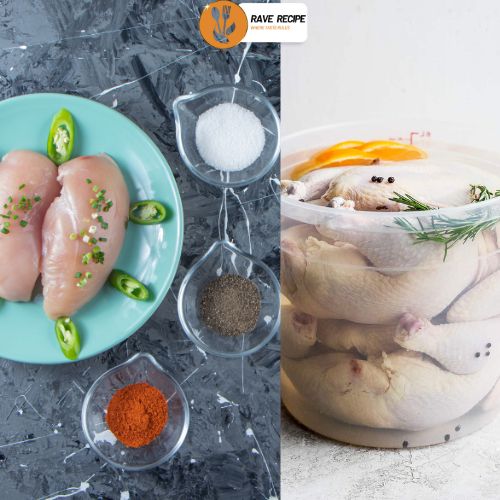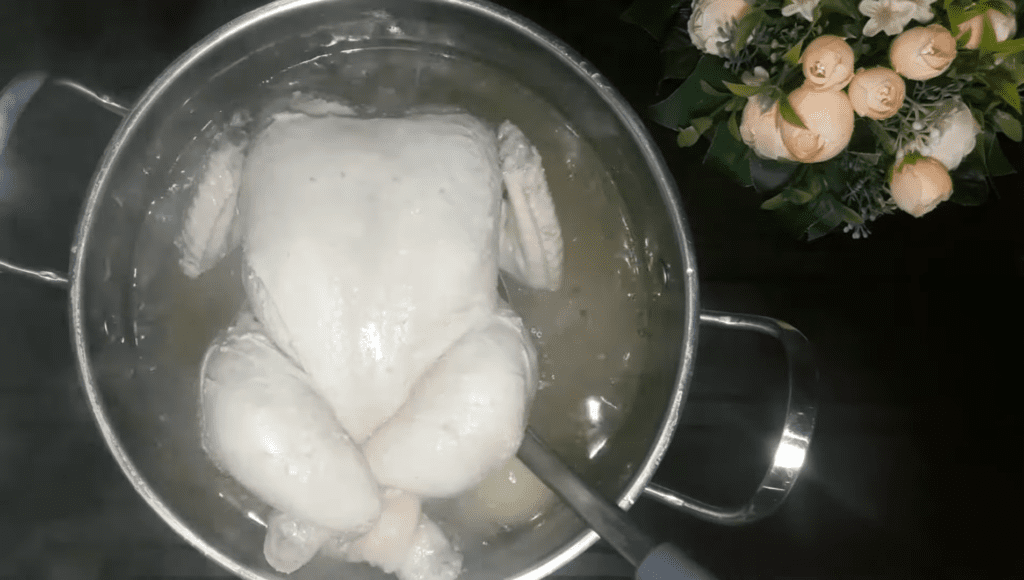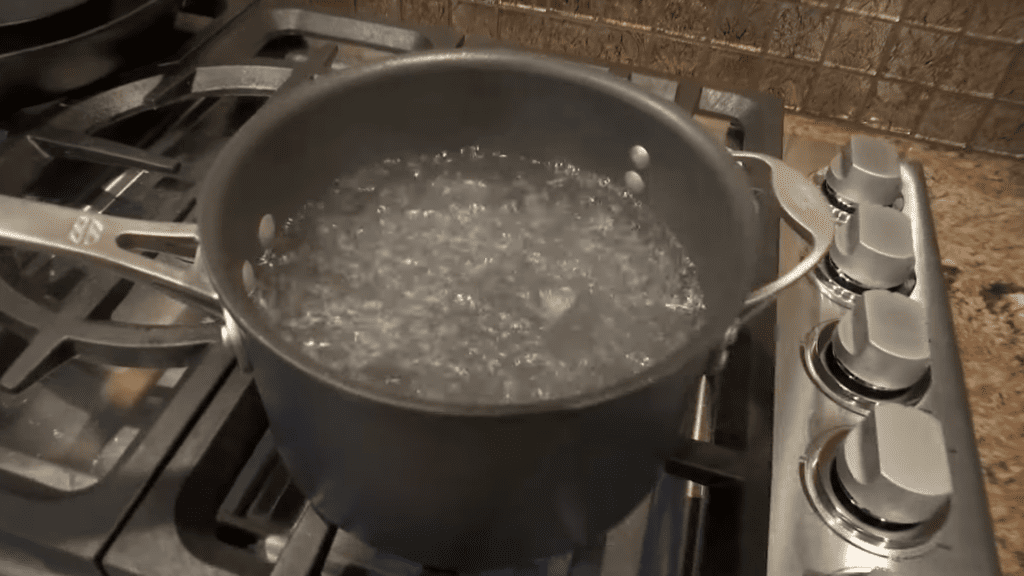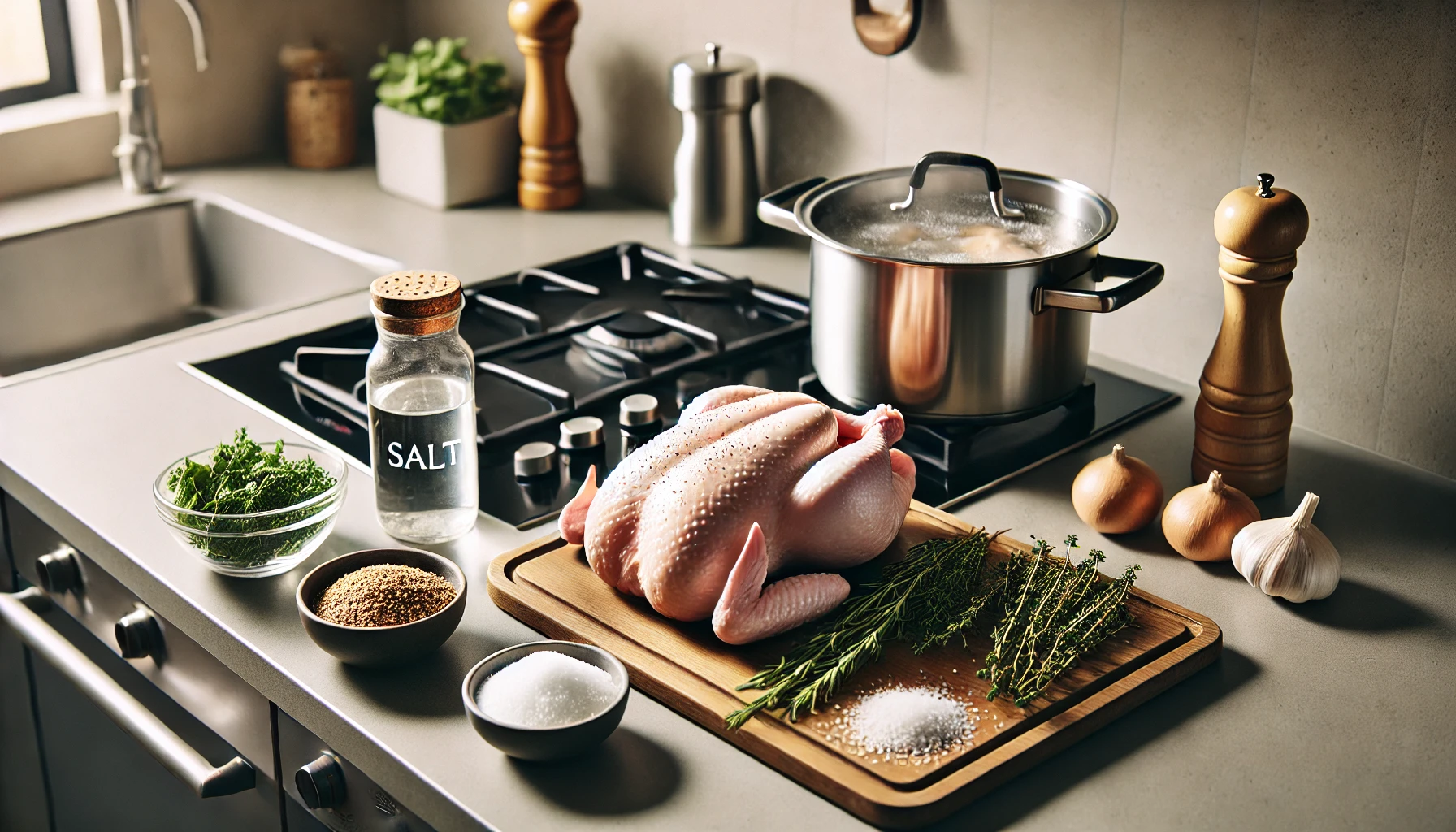Introduction to Brining Chicken
Brining chicken is a culinary technique that has been around for ages, known for transforming even the most basic chicken dish into a succulent masterpiece. But as with any time-tested method, questions arise—like, “Do you have to boil water to brine chicken?” You might have heard that boiling the water is essential, while others swear by cold brining methods. This article will explore the role of boiling water in brining, compare it with non-boiling methods, and provide a detailed guide on how to brine chicken effectively, whether you choose to boil or not. So, let’s dive in and find out what’s truly necessary for perfect brined chicken.

What is Brining?
Brining is the process of soaking chicken in a mixture of water, salt, and sometimes sugar and spices. This technique is loved by many because it enhances both flavor and juiciness. The secret behind its effectiveness is osmosis—a process where salt draws moisture into the meat, making it tender and tasty.
You might think brining is only for special occasions, but it’s not. Once you try it, you’ll want to brine every time you cook chicken. Whether roasting a whole bird or grilling some breasts, brining elevates the dish to another level. Best of all, it’s simple, yet the results are extraordinary.
Importance of Brining for Chicken
Why should you brine chicken? It’s simple: brining makes chicken taste amazing. By soaking the chicken in a brine, you lock in moisture and flavor, ensuring that every bite is juicy and delicious. This is especially helpful for lean cuts like chicken breasts, which tend to dry out during cooking.
Brining also helps with even cooking. When you brine a whole chicken, the salt penetrates deep into the meat. This makes it more forgiving if you overcook it slightly. The result? A moist, tender chicken with unbeatable flavor.
So, whether you’re cooking a quick dinner or a fancy roast, brining is a technique that can transform your chicken. And as we explore further, we’ll discover whether boiling water is necessary for a perfect brine.
Understanding the Role of Boiling Water in Brining
Why Boil Water in a Brine?

Boiling water for a brine isn’t just about getting the salt to dissolve faster. It’s also about unlocking the full potential of the brine. When you boil water, the heat helps the salt and sugar dissolve more thoroughly, creating a more concentrated solution. This can lead to a more effective brine, where the flavors penetrate the chicken more deeply.
But that’s not all. Boiling water can also help extract more flavor from herbs and spices if you’re adding them to your brine. The heat releases the essential oils and aromas, infusing the brine with a richer taste. For example, if you’re using garlic, rosemary, or bay leaves, boiling the brine can amplify their flavors, making the chicken even more delicious.
However, boiling water isn’t always necessary. There are situations where cold brining works just as well. The key is knowing when to use each method, which we’ll explore next.
When You Should and Shouldn’t Boil Water
So, when should you boil the water for your brine? The answer depends on your ingredients and time constraints. If you’re in a rush and need the brine ready quickly, boiling the water can help. The salt and sugar dissolve almost instantly, and you can cool the brine down with some ice before adding the chicken.
On the other hand, if you have time, you might prefer cold brining. It’s less intense and allows for a slower, more controlled brining process. This method is particularly useful if you’re using delicate herbs or want to avoid the risk of cooking the chicken prematurely.
In short, boiling water is a tool, not a rule. It’s useful for certain situations but not mandatory for every brine. As we move forward, I’ll show you how to prepare a brine using both hot and cold methods, so you can choose the one that works best for you.
How to Prepare a Brine for Brining Chicken
Basic Brining Recipe Without Boiling Water
Not everyone wants to boil water for a brine, and the good news is, you don’t have to. A basic cold brine is easy to make and just as effective in most cases. Here’s how you can do it:
- Start by mixing cold water with salt in a large container. The standard ratio is one cup of kosher salt per gallon of water. Stir until the salt dissolves. It might take a bit longer than with hot water, but it will eventually dissolve.
- Add any additional ingredients, like sugar, garlic, or herbs. These are optional, but they can add layers of flavor to your chicken.
- Submerge your chicken in the brine, making sure it’s fully covered. Then, place the container in the refrigerator and let it brine for the recommended time based on the cut of chicken.
This method is simple and effective. It doesn’t require any heating or cooling time, making it convenient if you’re short on time or just want to keep things easy.
Brining Recipe Using Boiled Water
If you’re looking for a more intense brine, boiling the water might be the way to go. This method can speed up the process and infuse more flavor into the chicken. Here’s how to do it:
- Boil a portion of the water with salt until it completely dissolves. The ratio remains the same—one cup of kosher salt per gallon of water.
- Add your flavorings—like garlic, herbs, and spices—while the water is still hot. Let the mixture simmer for a few minutes to extract the maximum flavor.
- Remove the brine from heat and add cold water or ice to bring the temperature down. The brine needs to be cool before you add the chicken, so you don’t start cooking it prematurely.
- Submerge your chicken in the cooled brine, ensuring it’s fully covered. Then, refrigerate it for the recommended time.
This hot brining method is a bit more involved but offers deeper flavor penetration. It’s especially useful if you’re working with tougher cuts of chicken or want a more robust taste.
Safety Considerations
When using hot water to prepare a brine, safety is crucial. Always allow the brine to cool completely before adding the chicken. If the brine is too hot, it can start cooking the meat, leading to uneven brining and potentially tough chicken.
After cooling the brine, always refrigerate the chicken while it’s brining. This ensures that the meat stays at a safe temperature, reducing the risk of bacterial growth.
By following these steps, you can choose the best brining method for your needs, whether you prefer the simplicity of cold brining or the intensity of hot brining.
Pros and Cons of Boiling Water in Brining
Benefits of Boiling Water in Brining
Boiling water for your brine can offer several advantages, especially if you’re aiming for a more intense flavor. One of the key benefits is the speed at which the salt and other ingredients dissolve. When you use hot water, the salt dissolves almost instantly, creating a highly concentrated brine. This concentrated solution allows the flavors to penetrate the chicken more deeply, making every bite more flavorful.
Another advantage is the ability to extract more flavor from herbs and spices. When these ingredients are added to hot water, the heat releases essential oils and aromas, intensifying their flavors. For example, adding garlic, rosemary, or bay leaves to hot brine can result in a more robust and aromatic chicken.
Boiling water can also help you achieve a consistent brine, especially if you’re using coarse salt or large amounts of sugar. These ingredients can take longer to dissolve in cold water, leading to uneven brining. With hot water, you ensure that everything is fully dissolved and evenly distributed throughout the brine.
Potential Drawbacks
While boiling water for brining has its perks, it’s not without downsides. One significant drawback is the risk of overcooking the chicken if the brine isn’t cooled properly. If you add chicken to a hot brine, the outer layers can start cooking, leading to uneven texture and flavor.
Another consideration is the extra time and effort required. Boiling the water, dissolving the ingredients, and then waiting for the brine to cool can be time-consuming. If you’re in a hurry, this might not be the most convenient method.
Additionally, boiling water can sometimes strip delicate flavors from herbs and spices, especially if they’re simmered for too long. While boiling enhances some flavors, it can diminish others, particularly if you’re using fresh herbs.
In summary, while boiling water in your brine can enhance flavor and ensure consistency, it’s not always necessary. Weighing the pros and cons can help you decide if this method is right for your specific recipe.
Common Myths and Misconceptions
Do You Always Need to Boil Water?

One of the most common myths about brining is that you always need to boil the water. While boiling can enhance certain aspects of the brining process, it’s not a strict requirement. In fact, many experienced cooks prefer cold brining, especially when they want a more subtle flavor or when they’re short on time.
Cold brining is just as effective in most cases. The salt will dissolve in cold water, albeit more slowly, and the chicken will still absorb the flavors. So, the idea that boiling is a must is simply not true. What’s more important is that you choose the method that best suits your needs and the time you have available.
Impact of Boiling Water on Different Cuts of Chicken
Another misconception is that boiling water is necessary to brine all types of chicken cuts. The truth is, different cuts of chicken respond differently to brining, whether you use hot or cold water. For instance, delicate cuts like chicken breasts can actually benefit from a cold brine, which is less likely to cook the meat prematurely.
On the other hand, tougher cuts like thighs or a whole chicken might respond better to a hot brine, where the flavors can penetrate more deeply and quickly. But even then, boiling isn’t mandatory. It’s more about the desired outcome and the specific recipe you’re following.
In summary, boiling water can be beneficial, but it’s not a universal rule. Understanding the nuances of different brining methods can help you achieve the best results, regardless of the chicken cut you’re working with.
FAQs on Brining Chicken Without Boiling Water

When it comes to brining chicken, there are plenty of questions that pop up, especially about whether or not you need to boil water. In this section, we’ll tackle some of the most frequently asked questions to clear up any confusion.
Can you brine chicken without boiling water?
Absolutely! You don’t need to boil water to brine chicken. Cold brining is a common method that works just as well in many cases. The key is ensuring that the salt fully dissolves and that the chicken has enough time to soak up the flavors. Cold brining is not only convenient, but it also reduces the risk of overcooking the chicken during the brining process.
What happens if you don’t boil the water for brine?
If you don’t boil the water, the salt and sugar might take longer to dissolve, but the overall effectiveness of the brine remains. The chicken will still absorb the flavors and moisture, resulting in tender, juicy meat. Just make sure to stir the brine well to ensure that all the salt is dissolved before adding the chicken.
How long should I brine chicken without boiling water?
The brining time for chicken doesn’t change whether you use boiling or cold water. The time depends on the cut of chicken you’re using. For instance, a whole chicken might need 8-12 hours, while chicken breasts can be brined in as little as 30 minutes to 2 hours. Cold brining typically requires a bit more patience, but the results are equally satisfying.
Is cold brining as effective as hot brining?
Cold brining can be just as effective as hot brining, depending on your goals. Cold brining is gentler and allows for a more controlled infusion of flavors, making it ideal for delicate cuts of chicken. Hot brining, on the other hand, can speed up the process and extract more intense flavors, which might be preferred for tougher cuts. The effectiveness really comes down to personal preference and the specific recipe you’re following.
Can you use warm water instead of boiling water for brining?
Yes, you can use warm water to speed up the dissolving process without fully boiling it. Warm water can help dissolve the salt and sugar more quickly than cold water, but it’s less intense than using boiling water. Just be sure to cool the brine to room temperature or lower before adding the chicken, to avoid any cooking before you’re ready.
Conclusion and Final Thoughts
Brining chicken is a time-honored technique that can elevate your cooking, whether you’re preparing a simple weeknight dinner or a special feast. While the question of whether or not to boil water for brining might seem crucial, the reality is that it depends on your specific needs and preferences.
Boiling water can speed up the brining process and intensify flavors, making it a good choice for those looking for a more robust taste. However, cold brining offers a gentler approach, allowing for a slower, more controlled infusion of flavors. Both methods have their benefits, and neither is strictly better than the other.
The most important takeaway is that you don’t have to boil water to create an effective brine. Whether you choose to boil or not, what matters is understanding how each method works and applying it in a way that best suits your cooking style and the dish you’re preparing.
So, the next time you’re planning to brine chicken, consider what you want to achieve with your brine. If you’re in a rush and need deep flavors fast, boiling might be your go-to. But if you’re looking for a more delicate, controlled process, cold brining could be the perfect solution.
In the end, the best brine is the one that works for you. Don’t be afraid to experiment with different techniques to discover what brings out the best in your chicken. Happy brining!

